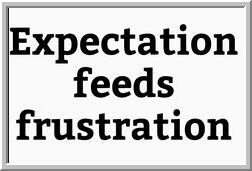 What you believe, consciously or unconsciously, propels your trading in its many directions. It might be so simple a matter as whether you believe a market is going up or down or nowhere. Traders have biases that distort their perceptions and effect their actions, and they need to guard against these with various protections and bias detectors.
What you believe, consciously or unconsciously, propels your trading in its many directions. It might be so simple a matter as whether you believe a market is going up or down or nowhere. Traders have biases that distort their perceptions and effect their actions, and they need to guard against these with various protections and bias detectors.
Other beliefs are more veiled and ubiquitous. For example, you may consciously intend to make money, but you have a counter impulse that thwarts you due to unconscious beliefs that go against that intention. Perhaps you unconsciously believe that money is the root of all evil, or that rich people are corrupt, or that there isn’t enough to go around and so you shouldn’t be greedy, or that you should be laying up your treasure in heaven, and not on this earth. Perhaps on some level you believe you shouldn’t make more money than your parents.
When you want something, you have to really want it and not be ambivalent about it. It has to be your desire, and not some alien value set by your parents or society. The flower loves the sun, and stretches to receive its rays. The plant loves water and digs its roots deep seeking the object of its desire. If you want to make money trading, you really have to admire money and have good purposes for its use. If you want to be a master trader, you have to be comfortable with that role, and not see trading as wasteful gambling, or an unworthy profession.
Perhaps you believe that you don’t deserve to make money trading, or that you have to work hard for your rewards. Maybe you believe that only the big boys win, that the market is stacked against the ordinary trader. Maybe you believe that it’s impossible to make money in the futures markets or, worse, any market. Maybe you believe it’s possible to make money trading, but it’s not probable that you can keep your winnings. All such ideas run in opposition to easy and effective trading.
Just as insidiously you may doubt that your system really works, or that it won’t work this time. Some traders get superstitious: for example, they believe that they always, or tend to, lose money on Fridays, and so, of course, they do. When any of their superstitious factors occur, somehow they manage to lose.
Strong emotions also get in the way of winning. Underlying each emotion is some belief about what is happening. The interpretations you give events color your reality. Underneath each interpretation is a rock core belief. “That’s just the way it is.” you say. Such a statement flags a belief. Is it really the way it is? Do you feel guilty, scared, angry, or depressed after a losing trade? Perhaps you believe that you shouldn’t lose, that one losing trade implies you can’t trade, that one losing trade portends many more losing trades, or that you’ve jinxed yourself for the rest of the day or week.
Equally or possibly even more important are the positive conscious and unconscious beliefs that you hold about trading and investing.
To begin with, to do anything well, you need to believe that it can be done, that you can do it, and that you deserve to do it. You’re in trouble if you doubt any of these three. Your trading is at risk if you don’t firmly believe that money can be made trading, that you can make money trading, and that you deserve to make money trading. (more…)

 Research shows that you can learn more in few days than you can learn in a year. A focused approach to solving a problem where you put lot of efforts in short period of time leads to expansion of you ability to process and analyse information. That is survival mechanism.
Research shows that you can learn more in few days than you can learn in a year. A focused approach to solving a problem where you put lot of efforts in short period of time leads to expansion of you ability to process and analyse information. That is survival mechanism. 




